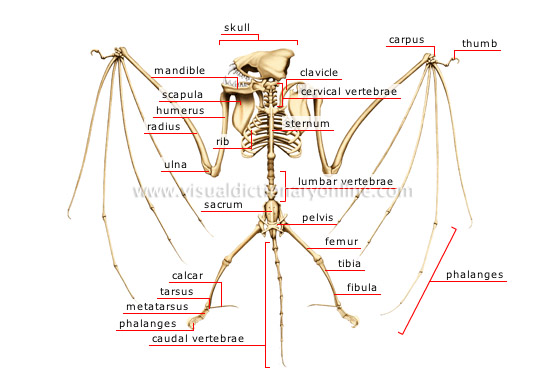skeleton of a bat
calcar 
Cartilaginous structure attached to the tarsus and supporting the interfemoral membrane.
caudal vertebrae 
Bony parts comprising the skeleton of the tail located at the terminal end of the vertebral column.
lumbar vertebrae 
Bony parts of the back located between the thoracic and sacral vertebrae.
cervical vertebrae 
Bony parts of the neck comprising the upper terminal end of the vertebral column.
sacrum 
Bone resulting from the fusion of several vertebrae and located between the lumbar and caudal vertebrae; the pelvis articulates with it.
pelvis 
Bony girdle serving as an attachment point for the legs.
femur 
Long bone of the hind limb articulating with the pelvis, the tibia and the fibula.
fibula 
Long bone forming the outer limb between the femur and the tarsus.
tibia 
Long bone forming the inner limb between the femur and the tarsus.
phalanges 
Articulated bones forming the skeleton of the fingers and supporting the interfemoral membrane.
tarsus 
Portion of the foot formed of short bones between the tibia, the fibula and the metatarsus.
thumb 
First digit of the wing; it is short and bears a claw.
phalanges 
Articulated bones forming the skeleton of the fingers and supporting the wing membrane.
carpus 
Portion of the wing formed of two short bones; it is located between the radius, the ulna and the metacarpus.
ulna 
Wing bone between the humerus and the carpus.
radius 
Long and powerful wing bone supporting the wing membrane.
humerus 
Long wing bone articulating with the scapula to form the shoulder.
scapula 
Large thin flat bone; with the clavicle, it serves as an attachment point for the wing.
clavicle 
Long bone located between the sternum and the scapula.
rib 
Thin curved bone articulating with the vertebral column and the sternum.
sternum 
Long flat bone to which certain ribs are attached; powerful flight muscles are inserted into its crest.
skull 
Bony structure enclosing and protecting the brain.
mandible 
Toothed bone forming the lower jaw.








